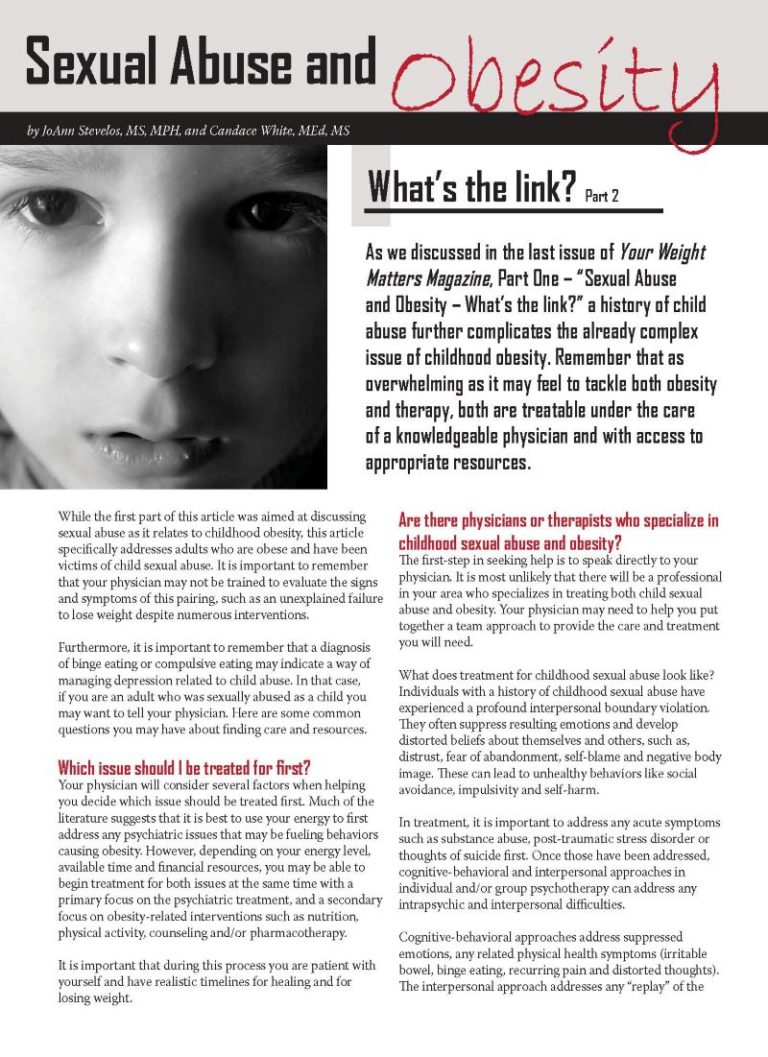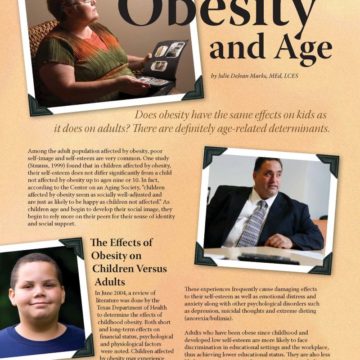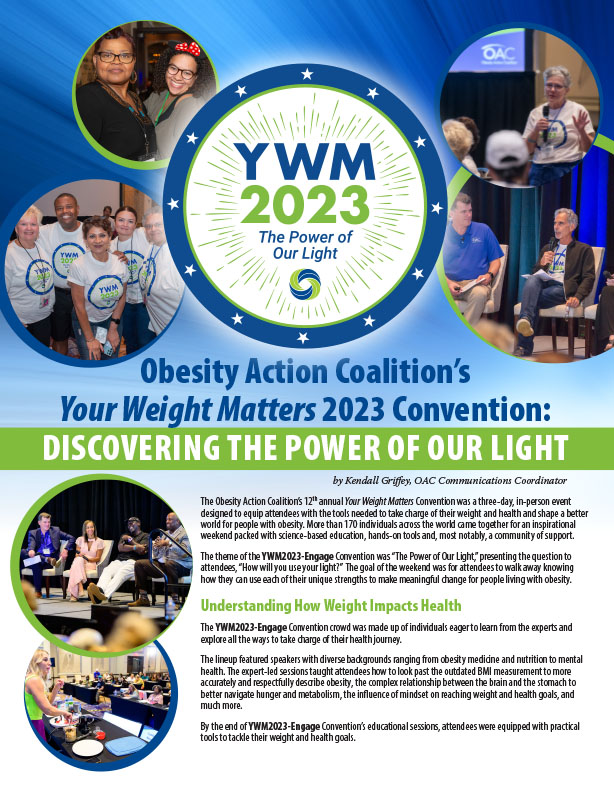Sexual Abuse and Obesity – Part 2


by JoAnn Stevelos, MS, MPH, and Candace White, MEd, MS
Winter 2011
What’s the link?
As we discussed in the last issue of Your Weight Matters Magazine, Part One – “Sexual Abuse and Obesity – What’s the link?” a history of child abuse further complicates the already complex issue of childhood obesity. Remember that as overwhelming as it may feel to tackle both obesity and therapy, both are treatable under the care of a knowledgeable physician and with access to appropriate resources.
While the first part of this article was aimed at discussing sexual abuse as it relates to childhood obesity, this article specifically addresses adults who are affected by obesity and have been victims of child sexual abuse. It is important to remember that your physician may not be trained to evaluate the signs and symptoms of this pairing, such as an unexplained failure to lose weight despite numerous interventions.
Furthermore, it is important to remember that a diagnosis of binge eating or compulsive eating may indicate a way of managing depression related to child abuse. In that case, if you are an adult who was sexually abused as a child you may want to tell your physician. Here are some common questions you may have about finding care and resources.
Which issue should I be treated for first?
Your physician will consider several factors when helping you decide which issue should be treated first. Much of the literature suggests that it is best to use your energy to first address any psychiatric issues that may be fueling behaviors causing obesity. However, depending on your energy level, available time and financial resources, you may be able to begin treatment for both issues at the same time with a primary focus on the psychiatric treatment, and a secondary focus on obesity-related interventions such as nutrition, physical activity, counseling and/or pharmacotherapy.
It is important that during this process you are patient with yourself and have realistic timelines for healing and for losing weight.
Are there physicians or therapists who specialize in childhood sexual abuse and obesity?
The first-step in seeking help is to speak directly to your physician. It is most unlikely that there will be a professional in your area who specializes in treating both child sexual abuse and obesity. Your physician may need to help you put together a team approach to provide the care and treatment you will need.
What does treatment for childhood sexual abuse look like?
Individuals with a history of childhood sexual abuse have experienced a profound interpersonal boundary violation. They often suppress resulting emotions and develop distorted beliefs about themselves and others, such as, distrust, fear of abandonment, self-blame and negative body image. These can lead to unhealthy behaviors like social avoidance, impulsivity and self-harm.
In treatment, it is important to address any acute symptoms such as substance abuse, post-traumatic stress disorder or thoughts of suicide first. Once those have been addressed, cognitive-behavioral and interpersonal approaches in individual and/or group psychotherapy can address any intrapsychic and interpersonal difficulties.
Cognitive-behavioral approaches address suppressed emotions, any related physical health symptoms (irritable bowel, binge eating, recurring pain and distorted thoughts). The interpersonal approach addresses any “replay” of the interpersonal behaviors learned from abusers in childhood, like submissiveness and learned helplessness. Empowerment approaches are also useful in normalizing reactions to abuse and internalizing positive and powerful views of self.
What can I expect at the therapist’s office and physician’s office?
Your experience will vary depending on whether you are seeing a psychotherapist or general practitioner (GP). Psychotherapists (psychologists, social workers and mental health counselors) are generally trained in short and long-term psychotherapy interventions whereas GPs have medical training.
When seeking treatment and support for difficulties related to childhood sexual abuse, it is recommended that you see a psychotherapist. Feel free to look around for a good fit when looking for a new psychotherapist. Improvement is highly related to the level of comfort that you feel with the clinician. You can ask your potential therapist about his or her level of experience and preferred approach in treating childhood sexual abuse and/or obesity.
When can I expect to feel better? How long are interventions?
Several studies have demonstrated positive outcome from psychotherapy with adult survivors of childhood sexual abuse within 10-24 weeks. Benefits from cognitive-behavioral approaches that address the distorted thoughts associated with childhood sexual abuse can often appear within a few sessions. Change in interpersonal behavior and other difficulties often take a bit more time given the difficulty that childhood sexual abuse survivors often have with trusting others, including clinicians.
It might also take some time to address the long suppressed emotions that surround the abuse. With the help of a supportive and empathic clinician and/or group however, survivors can begin to address these intrapsychic and interpersonal difficulties.
Conclusion
Sexual abuse and obesity are two very delicate subject matters for any individual. An individual’s mind, body and spirit can be detrimentally affected by sexual abuse and quite often those affected may not want to seek help or guidance. They may feel ashamed of their situation or guilty by thinking that the abuse was their fault. It is very important for the individual to contact a healthcare professional for more information regarding their situation.
Online Resources for Adult Victims of Childhood Sexual Abuse
We Are Adult Survivors of Child Abuse and Neglect
www.wearesurvivors.org
Stop It Now
www.stopitnow.org
American Psychological Association – Understanding Child Sexual Abuse
www.apa.org
About the Authors:
JoAnn Stevelos, MS, MPH, is a public health professional and consultant. Ms. Stevelos is the former director of the New York State funded Center for Best Practices for the Prevention of Early Childhood Obesity. She is currently the Chief Operating Officer for Verdade Consulting Group Inc., a small firm specializing in medical research ethics, bioethics, public health and health law. Ms. Stevelos is a member of the OAC Advisory Board.
Candace White, MEd, MS, is a practicing psychotherapist and doctoral student in social welfare at SUNY Albany. She has worked in various mental health research and clinical settings including McLean and Massachusetts General Hospitals, and was previously an adjunct psychology professor at colleges in upstate NY.
by Robyn Pashby, PhD Winter 2024 “No one is ever going to date you if you don’t…
Read Articleby Kendall Griffey, OAC Communications Coordinator Winter 2024 The Obesity Action Coalition’s 12th annual Your Weight Matters…
Read Articleby Nina Crowley, PhD, RD (with Inspiration from Shawn Cochran) Winter 2024 Dating, no matter your age,…
Read Article









